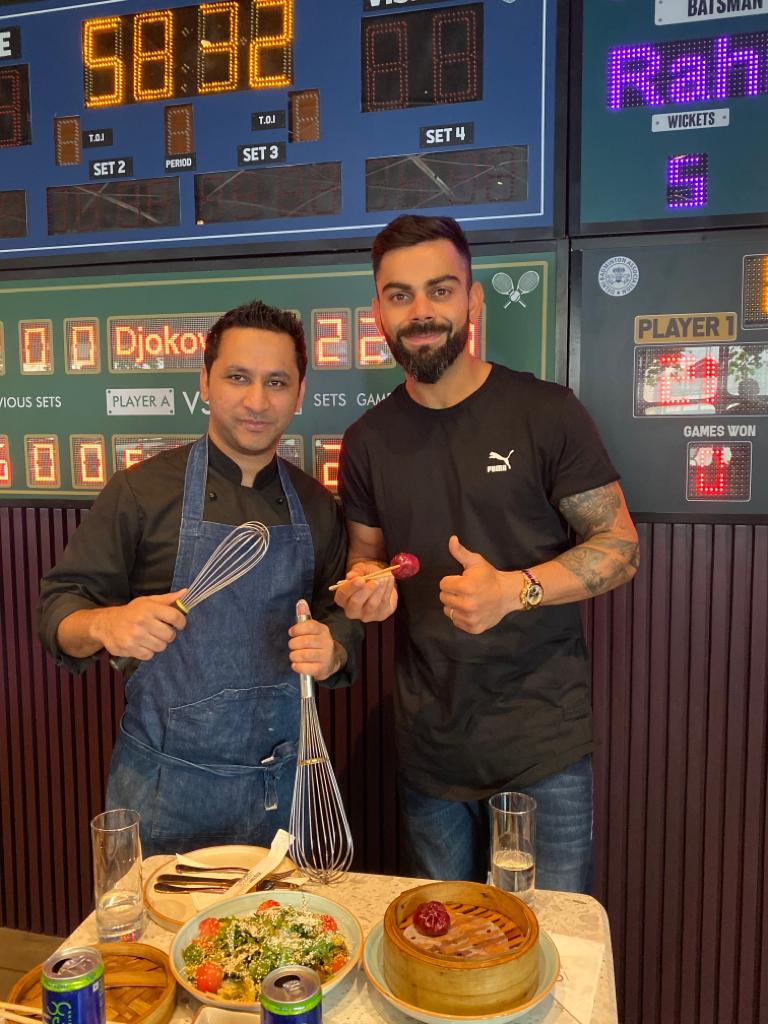
From Sunil Shetty's H2O, Arjun Rampal's Lap and Sachin Tendulkar's 'Tendulkar's', to Virat Kohli's One8 Commune, Shilpa Shetty's Bastian, Kumar Sangakkara and Mahela Jayawardene's Ministry of Crab.
More recently, other celebs to jump on the bandwagon include Genelia D'Souza and Riteish Deshmukh with Imagine Meats, Malaika Arora with NUDE Bowls, BJP politician Tejinder Singh Bagga with Kulhad Biryani and comedian Zakir Khan with Mehfil Biryani.
From lavish pubs and trendy discos in the early 2000s, to fine dine and themed restaurants post-2010 and finally, cloud kitchens and vegan and plant-based meat brands after 2015, the way Indian celebrities invest in food ventures has changed considerably.
But, what attracts celebrities to an industry where returns haven't always been favourable? Case in point, among the ventures mentioned above, the ones owned by Shetty, Rampal and Tendulkar have shut shop. And so have plenty of others, such as Sourav's—The Food Pavilion by cricketer Sourav Ganguly in Kolkata—all within a span of a few years.

Chef Pawan Bisht, corporate chef and Research and Development executive at One8 with Virat Kohli. (Source: Pawan Bisht)
The Challenge
Opening a restaurant is capex-intensive. And, getting decent returns on it—alongside doling out high daily costs of labour and raw materials—takes time, depending on the size and nature of the establishment.
The major motivation for stars to enter the food industry is that it's fashionable and glamorous, according to Rakesh Talwar, chef, restaurateur and food consultant. Talwar owns eight restaurants in Mumbai, alongside establishments in Taiwan, Hong Kong, Dubai and other locations.
"Restaurants are great eye candy now. Celebrities like to show their restaurants off. Sometimes, there's also great passion involved. But there is money to be made. If the celebrities get the right team on board, it can be a sound investment," he said.
Talwar teamed up with Bollywood choreographer Remo D'Souza for his restaurant in Mumbai, named Ministry of Dance. That, too, ended up shutting in 2020 due to the pandemic, after about eight months of operations.
Typically in a restaurant, whenever a celebrity is involved, it's always on a partnership basis with a seasoned entrepreneur or restaurateur. "Celebrities almost never pick up a majority stake in such ventures. They would take up about 20-25% equity and leave the rest up to other investors," Talwar said.
Suprio Bose, another restaurant consultant, concurred. "It has often happened that some celebrities have worked with the wrong consultants, ones that are short-sighted," he said.
"With celebrities, a venture works when they also show keen interest. Juhi Chawla and Jay Mehta's Mumbai restaurants—Rue Du Liban and Gustoso—have done well in that sense. There's a lot of owner intervention," Bose said.
Another fast-growing venture is Kohli's One8Commune. The cricketer has partnered with Delhi-based entrepreneur and restaurateur Ankit Tayal for the dine-in chain, which has grown from one outlet in Delhi's Aerocity in 2019 to about three in Delhi, and one each in Mumbai, Pune, Kolkata and Dubai. Two are coming up in Bengaluru and Gurugram as well.
A gestation period for a restaurant to start giving returns is anywhere between six months and three years, according to Bose. "And that's not a life cycle celebrities are used to. Eventually, they kind of pare their stake or the restaurant shuts down. This is quite common ... Having said that, it's an easy investment, with the lure of having a nightclub or a beautiful bar."

Zakir Khan's Mehfil Biryani. (Source: Company website)
The Alternate Option
Arora, Khan and Bagga are investing in building brands that are closer to them, even if it means opening a cloud kitchen-first brand and delivering only via platforms, such as Zomato and Swiggy, instead of going for a lavish sit-down space.
Khan signed a deal with BigSpoon—a multi-brand cloud kitchen startup—for a delivery-only celebrity brand, Mehfil Biryani. The company claimed to be the largest single-day food and beverage launch ever in India, with 28 cities and 66 outlets.
According to Rajat Tuli, partner at consulting firm Kearney and a HoReCa analyst, celebrities have typically started investing in things they stand for.
"I've seen a lot of celebrity investments in vegan or plant-based protein, which somewhat symbolise what they stand for. It makes the brand more authentic," he said.
Cloud kitchens act as big savers on two major cost drivers for a restaurant—rent and labour, Tuli said. "Cloud kitchen has an advantage in terms of rentals. The store size is smaller and it also doesn't need to be bang in the middle of a high street. Offbeat locations work. Secondly, the kind of people you require cost lower to run a cloud kitchen."
Essentially, the economics of a cloud kitchen is to cross Rs 10 lakh a month in sales. "That's the point where one starts making good money. And so, cloud kitchens are typically a lower risk investment, compared to a restaurant. The initial capex is far lower."
Cloud kitchens are relatively new. When a celebrity wanted to enter the food industry about 10 years ago, it was effectively via a dine-in restaurant, Tuli said. "It had to be classy, high street footfall location, larger size. It had to reflect the celebrity brand and therefore, higher capex."
According to Talwar, cloud kitchens are sound investments, especially post-pandemic. "They are a good conduit using which celebrities can test the waters for 1-1.5 years and know what sells and what doesn't."
Pawan Bisht, corporate chef and Research and Development executive at One8, said cloud kitchens also serve another purpose. "They are great places for celebrities to test out a market and their product. It is a way to start small and is a gateway for experiments. Once they know what works, they can move on to a sit-down place that is more in accordance with their brand."
Essential Business Intelligence, Continuous LIVE TV, Sharp Market Insights, Practical Personal Finance Advice and Latest Stories — On NDTV Profit.























